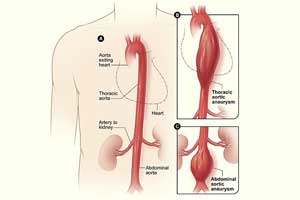- Home
- Editorial
- News
- Practice Guidelines
- Anesthesiology Guidelines
- Cancer Guidelines
- Cardiac Sciences Guidelines
- Critical Care Guidelines
- Dentistry Guidelines
- Dermatology Guidelines
- Diabetes and Endo Guidelines
- Diagnostics Guidelines
- ENT Guidelines
- Featured Practice Guidelines
- Gastroenterology Guidelines
- Geriatrics Guidelines
- Medicine Guidelines
- Nephrology Guidelines
- Neurosciences Guidelines
- Obs and Gynae Guidelines
- Ophthalmology Guidelines
- Orthopaedics Guidelines
- Paediatrics Guidelines
- Psychiatry Guidelines
- Pulmonology Guidelines
- Radiology Guidelines
- Surgery Guidelines
- Urology Guidelines
Fluoroquinolones associated with increased risk of aortic aneurysm

Fluoroquinolone antibiotics are used globally to treat a variety of infections. Recent observational studies have raised concerns that they may be associated with a more than twofold increase in the risk of an aortic aneurysm or dissection. Researchers from Karolinska Institutet and Lund University in Sweden and Statens Serum Institute in Denmark analysed data from Swedish national health registers to assess whether there actually was any link. The team of researchers have found out a link between treatment with fluoroquinolone antibiotics and an increased risk of acute aortic disease. The study is published in the journal The BMJ.
The researchers compared the risk of aortic aneurysm or dissection among more than 360,000 treatment episodes of fluoroquinolones with the risk among the same number of treatment episodes of amoxicillin, another type of antibiotic.The results show a 66 per cent increase in the risk of aortic aneurysm or dissection in patients treated with fluoroquinolone antibiotics. This corresponded to an absolute difference of 82 cases per 1 million treatment courses with fluoroquinolone antibiotics.
"Our results confirm the findings in the previous studies but suggest that the increased risk is not as pronounced as indicated by those studies," says Björn Pasternak, associate professor at Karolinska Institutet's Department of Medicine, Solna, who led the study.
Like the previous ones, the current study is an observational study that is unable to prove a causal relationship. However, according to Björn Pasternak, because of its size and methodological design, it provides the most reliable results so far.
"Although the absolute risk increase was relatively small, the study's findings should be interpreted in the context of the widespread use of fluoroquinolones. Our overall objective is to help inform clinical practice through high-quality evidence."
The researchers also highlight a possible mechanism that might explain the association.
"One of the factors involved in the development of aortic disease is increased activity in tissue-degrading enzymes known as matrix metalloproteinases. We know that fluoroquinolones induce the activity of these enzymes, which is also thought to underlie the more well-known adverse effect of tendon pain and rupture," says Björn Pasternak.
There was no specific funding for this study, but the researchers received support from the Strategic Research Area in Epidemiology at Karolinska Institutet, Swedish Government ALF project funding and the Lundbeck Foundation during the conduct of the study.
For more details click on the link: doi: https://doi.org/10.1136/bmj.k678

Disclaimer: This site is primarily intended for healthcare professionals. Any content/information on this website does not replace the advice of medical and/or health professionals and should not be construed as medical/diagnostic advice/endorsement or prescription. Use of this site is subject to our terms of use, privacy policy, advertisement policy. © 2020 Minerva Medical Treatment Pvt Ltd